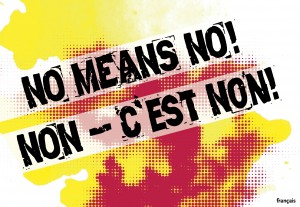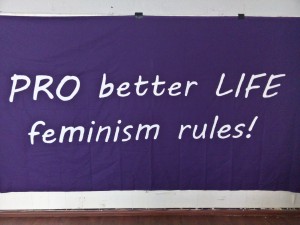On May 22nd the “Transnational Mobitour” for the G7 summit 2015 came to Dresden.
One person of e*vibes prepared a short input about “Coloniality and Gender”.
Here you can read it.
Coloniality and Gender
Coloniality is not equivalent to colonialism. Coloniality is the continuity of colonial forms of domination after the end of colonial administrations, produced by colonial cultures and structures in the modern/colonial capitalist world-system. Since Coloniality has never ended, we still live under the colonial matrix of power, described by Quijano. Within it, all power relationships like for example race, gender, religion, geographic origin and class are related. They organize the world division of labour in a multiple power hierarchic complex. As the same way that social understanding of “gender” was used by capitalist society to unpay women care and reproductive work; the ideas of race and cultural, spiritual and intellectual “inferiority” of the colonized people were also used as justification for their exploitation, servitude and slavery by the colonial structure.
But what has Coloniality to do with Gender?
It is important to remember that not all colonized civilizations were patriarchal and, when they were, their patriarchal forms of dealing with gender were not the same as the Judeo-Christian Patriarchy introduced by european colonization. Those societies had to adapt to a new form of hierarchy of gender coming from the oppressors and they were then ruled by it. The colonized people and cultures are usually described by traits historically related to “femininity” as naive, not intelligent, illogical, sentimental, natural, incapable and passive, while the colonizers are described by features historically related to “masculinity”, until today. That prejudices leads to the infantilization and inferiozation of people from colonial regions to be a common situation until today.
In Latin America, per example, the ethnical formation of the actual Latin American people was based on rape and forced marriage, as well as religious conversion of millions of native women since white European women were not available at the first phases of colonization process. These women were forced to deal with a complete different form of gender relationship and concepts of families. The miscegenation of Latin American people is also a result of the rape of millions of black enslaved women. Those native and black women were also seen as inferior to white European women and were hypersexualized, objectified and then completely excluded from history. Contrary to pre-European patriarchies, where all women were inferior to all men, in the new colonial power matrix some women (of European origin) have a higher status and access to resources than some men (of non-European origin), while the colored women occupied the most inferior level in society. And this situation has not changed until today. Gender issues were also used as an excuse for colonial projects. Spivak described this as “white men saving colored women from colored men”. It is until today that gender issues are used as an excuse for military and colonial, occidental projects.
Decolonization is still needed and an inseparable part of the struggle against capitalism and patriarchy. Paraphrasing Grossfoegel: The mythology of the “decolonization of the world” obscures the continuities between the colonial past and current global colonial/racial hierarchies and contributes to the invisibility of “coloniality” today as well as its relationship to other forms of hierarchies as patriarchy and capitalism inside the world matrix of power.




